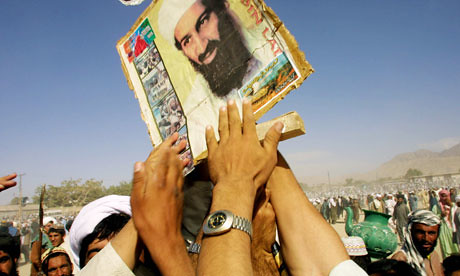
Rally in Central Asia where the photograph of Osama bin Laden is held up by participants. A Taliban commander says that the announced death of Bin Laden will be avenged., a photo by Pan-African News Wire File Photos on Flickr.
Afghan war not over despite bin Laden death: U.S. general
4:42pm EDT
By David Alexander
WASHINGTON (Reuters) - Al Qaeda leader Osama bin Laden's death was a blow to the Taliban insurgency and may lead some fighters to lay down their arms but the war in Afghanistan is far from over, a top U.S. combat commander said on Tuesday.
"One man does not make this war on terrorism," said U.S. Major General John Campbell, commander of the international forces in eastern Afghanistan. "They'll find somebody to replace him."
Campbell said the loss of bin Laden could hurt al Qaeda's ability to raise money, but added: "I don't think the war's over. I don't think the loss of bin Laden causes us to change our strategy."
Campbell, speaking by videolink to reporters at the Pentagon, said U.S.-led coalition forces in eastern Afghanistan near the Pakistani border have seen no surge in attacks as a result of bin Laden's death in a U.S. raid into Pakistan last week.
He said there has not been an increase in the pace of attacks in eastern Afghanistan since the Taliban launched a spring offensive beginning May 1. Campbell said that is partly because coalition operations in the winter destroyed double the number of Taliban weapons caches than the previous year and damaged the group's leadership structure.
"We have not seen, really, an uptick in Regional Command East on attacks," said Campbell, who is due to relinquish his command next week. "For about the 30 days prior to 1 May, the number of insurgent-initiated attacks was between 25 to 30 per month. That number after 1 May has continued to be the same."
The violence continued on Tuesday as Taliban fighters attacked a police outpost in a mountainous region of eastern Afghanistan in a gunfight lasting several hours, officials said.
President Barack Obama has vowed to begin in July a gradual withdrawal of U.S. troops from Afghanistan.
'GREAT POTENTIAL'
Campbell said bin Laden's death could spur an increase in the number of Taliban fighters seeking to participate in Afghanistan's re-integration program, under which they stop fighting, resume normal life and agree to back the government.
"I think because of ... the death of bin Laden that there's great potential that there will be many people out there that will want to come back in," he said.
"I think (Taliban leader) Mullah (Mohammed) Omar has seen what the coalition says: 'We're going to hunt you down. It may take awhile, it took almost 10 years here (with bin Laden). But we're not going to forget,'" Campbell said.
"And he (Mullah Omar) is in that category there, so I think for Mullah Omar, for the Taliban ... re-integration with the government of Afghanistan is the right future," he said.
While some Taliban fighters might seek to re-integrate, Campbell had doubts about the willingness of other insurgents to lay down arms, especially the Haqqani network, which he called "the most lethal threat" to Afghanistan in his region.
(Editing by Will Dunham)
No comments:
Post a Comment